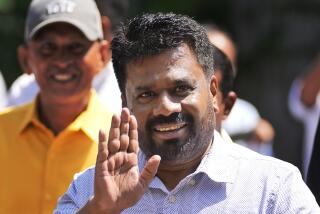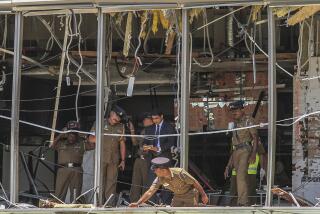Hope for Ravaged Sri Lanka
- Share via
South Asia is torn by violence, from Afghanistan to Nepal’s Maoist rebellion, from the India-Pakistan conflict to Sri Lanka, where more than 60,000 people have been killed in an 18-year-old civil war. The war in Afghanistan has brought to power a new government that offers hope for a more peaceful future. Elections held in Sri Lanka earlier this month offer the possibility of an end to the ethnic bloodbath, as does a monthlong cease-fire that took effect this week.
The parliamentary elections put in power an opposition party led by Ranil Wickreme-singhe, who campaigned on a promise to open talks with the guerrilla group the Liberation Tigers of Tamil Eelam. The Tigers have led a brutal fight for a separate homeland for Tamils on the island nation, south of India. For decades before the civil war, politicians from the two main ethnic groups played the race card with their fellow Tamils and Sinhalese, each demonizing the other side. The war itself has been marked by the brutality of Sinhalese troops and Tamil terrorists alike.
Prime Minister Wickremesinghe’s main political opponent, President Chandrika Kumaratunga, also ran on a peace platform when she was elected seven years ago. But an effort to negotiate with the Tigers, brokered by Norway, collapsed, and Kumaratunga lost an eye in an assassination attempt carried out by a suicide bomber who killed 26 other people. She eventually pushed for tougher military action against the Tigers, which the United States has named as a terrorist group.
Before the prime minister can start a new peace bid, he and the president need to cut down on their personal vilification of each other. Kumaratunga’s claim that Wickreme-singhe is a pawn of the Tigers is foolish. He too survived a suicide bomber’s attack and, like her, belongs to the majority Sinhalese ethnic group. Because of the way the constitution divides power between president and Parliament, the two need to cooperate.
Last month the Tigers’ leader indicated he would settle for less than an independent Tamil nation but said his group would negotiate only after the government lifted its ban on the guerrilla organization. Kumaratunga imposed the ban in 1998. Because it is relatively recent, it should be possible to repeal, if Wickremesinghe makes a persuasive case to his constituents.
Wickremesinghe is expected to seek help from India, which has a large Tamil population, in settling the ethnic crisis. However, 50,000 Indian soldiers failed to defeat the guerrillas in Sri Lanka more than a decade ago. More than a thousand Indian soldiers were killed, and in 1991 former Indian Prime Minister Rajiv Gandhi was assassinated by a Tamil suicide bomber. India has since steered clear of Sri Lanka’s internal affairs and isn’t likely to change course.
Sri Lanka is a lush tropical island that once had a flourishing economy and cradle-to-grave benefits. It has been hit hard by the nearly two decades of turmoil. Wickremesinghe is expected to concentrate on the economy, but first he must overcome his toughest barrier, satisfying the Tamil Tigers without leaving Sinhalese feeling that the prime minister is rewarding terrorism.
More to Read
Sign up for Essential California
The most important California stories and recommendations in your inbox every morning.
You may occasionally receive promotional content from the Los Angeles Times.













